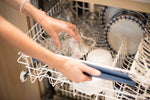Do you find yourself repairing pinhole leaks in your copper pipes every few months? If you are, then you might want to keep reading. There’s a couple of reasons why you’re experiencing these types of leaks in your plumbing. Below we’ll discuss two causes and resolutions to these pesky pinhole problems.
Minerals
If you are living with hard water, then you’ve got an increased level of calcium and magnesium floating around in your pipes. Those minerals are hitting the pipe walls with speed and pressure. Over time the walls become pitted and eventually wear down the copper and cause holes to appear. In addition to minerals, the water that’s flowing could contain silt or sediment and that in itself is abrasive in nature and would cause additional erosion of pipe walls.
Water Hammer
This occurs when there’s a sudden stop of water flow and it causes the pipes to make a banging sound because they are hitting other pipes or structures within the walls of a home. Let’s pretend that the pipes in your home are the freeway and water represents the cars. Everything is going smoothly, cars are traveling at a great speed, but all of a sudden a brick wall appears out of nowhere and traffic comes to a halt. All the cars start crashing into each other.
It’s the same principle with water, if the sprinklers are on at your home and you quickly turn off the valve, that abrupt closure is just like the brick wall on the freeway. Water will hit the valve and that energy gets transmitted through the pipes, and that’s what causes it to move and hit things. Do this repeatedly over time and it can weaken the joints in the pipes and cause leaks.
How to Fix This?
To fix the minerals issue mentioned above, the best long-term remedy is to install a whole house water softener. These systems are engineered to eliminate contaminants such as scale, iron, magnesium, and calcium. Adding a sediment pre-filter would help with any silt or sediment in the water. Placing it right before the softener will prevent it from coming into the home.

For water hammering, there’s a couple of things that could be done to prevent it. For starters, try and locate where the sound originates from. If you can hear the pipes banging when you turn off the bathroom faucet, then have a friend open and shut the lever until you can pinpoint the location of where the noise is coming from.
Hopefully you have access through a panel to the pipes, or through a crawl space. Once the culprit is located, the next step is to install a water shock absorber. An absorber is specifically designed to help minimize water pipes from making a banging noise caused by quick-closing valves. Shock absorbers have a built-in piston or diaphragm, that has up to 60psi of air in the chamber. Anytime the water valve is suddenly shut off, the water transmits a shock through the pipes and the diaphragm/piston compresses to absorb the energy that would normally be heard. In addition to installing an absorber, making sure that the pipes are secured properly on joists or studs with a non-metal clip to reduce any type of pipe movement.
Conclusion
Hopefully, you found this article useful in preventing pinhole leaks happening in your home. Installing a water softener is a sure-fire way to prevent any pipe corrosion from happening. Plus it provides your family soft water to enjoy. Fixing any water hammering issues is also a great way to prevent leaks since they are known to weaken joints over time from all the movement that happens when a valve is abruptly stopped.




